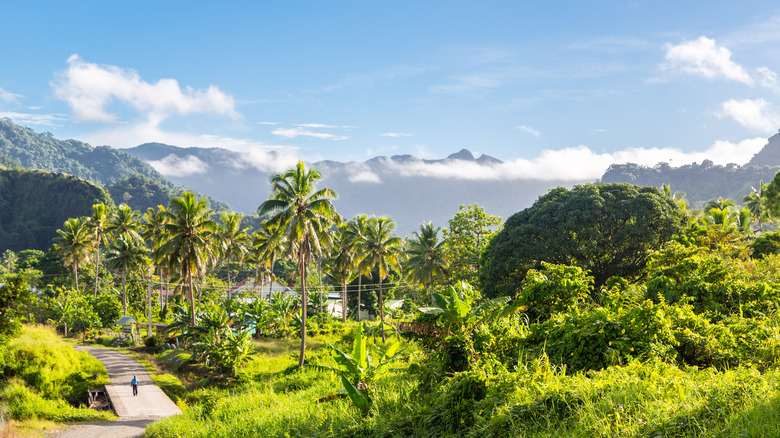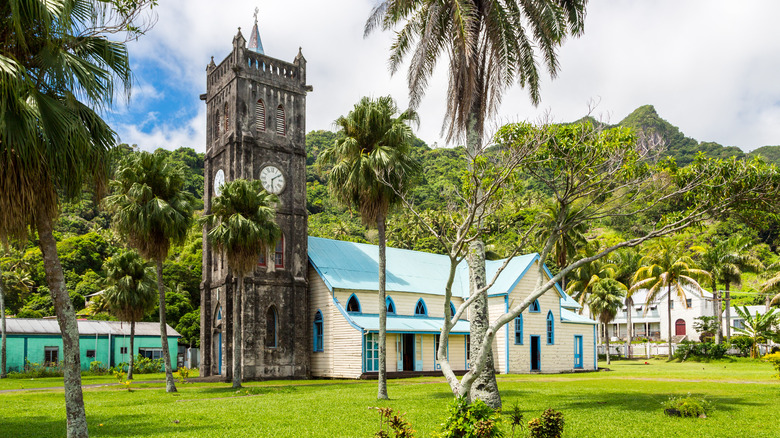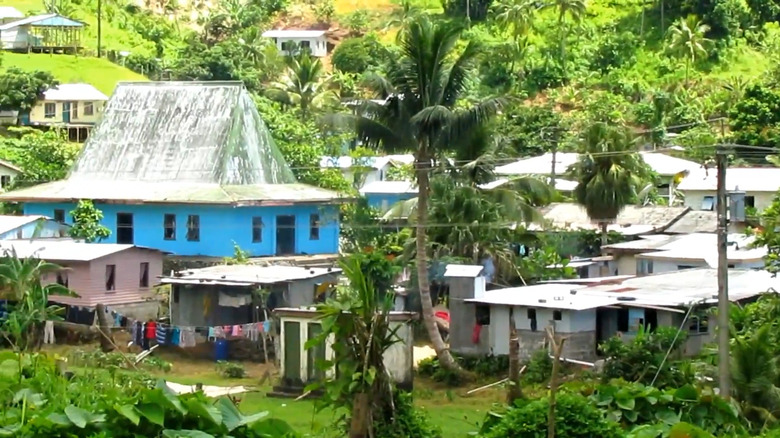One Of The Most Underrated Islands In Fiji Is This Destination Full Of History
Many people have a vacation on the beaches of Fiji on their bucket list, and with more than 300 islands, it's easy to choose a Fiji island to match your travel style. For some, an all-inclusive resort in Fiji is the way to go, but if you want to really understand Fiji, the island of Ovalau may be the one for you. Here, far from some of the bustling tourist hotspots like Denarau Island, you can immerse yourself in nature, experience the local culture, and learn about the fascinating, complex, and sometimes tragic history of the islands.
The first thing you're likely to notice about the island is its jagged green hills rising over the ocean. Like many islands, Ovalau was originally a volcano, and the ancient mountain forests and the reefs beneath the waves teem with life, making the island one of the most beautiful and biodiverse places on Earth. Both hiking and snorkeling around Ovalau will introduce you to some incredible creatures that only make their homes here.
Meanwhile, walking through Levuka, the largest community on the island, will take you back to the far more recent past: a time when Fiji was colonized by Europeans and Americans. However, a journey deeper into the center of the island to the community of Lovoni provides a glimpse of pre-colonial Ovalau.
Visit the 1800s colonial capital of Fiji
Levuka began as a trading post for European merchants and whalers, and as noted by the University of Cambridge's Museum of Archeology and Anthropology, had a reputation as being a chaotic and dangerous place to visit. Soon, however, Christian missionaries gained power and influence in Levuka, and the town grew. All around Fiji, conflicts arose between the people of Fiji and their colonizers, and in 1874, 13 kings of Fiji were forced to give up their kingdoms to the British in a ceremony on the outskirts of Levuka. Today, when you visit, you will find a monument commemorating the event on the site — together with a flagpole celebrating Fiji regaining its independence almost 100 years later, in 1970.
For a time, Levuka was the colonial capital of Fiji. While the capital was moved to Suva in 1882, Levuka remained a vital trading hub for America. Today, the port town is a UNESCO World Heritage Site, remaining largely the same as when it was active. Visitors to Ovalau can walk through the streets of Levuka and see the same churches, shops, and meeting places that would have been here in the 19th century.
Learn the history of Lovoni Village
There is a community in a volcanic crater near the center of the Fiji island: Lovoni Village. It is one of the best places in Fiji to learn about the culture, try the food, and honor those who came before. You will also get to learn about the history of this community, both the good and the bad.
Once, Lovoni Village was a kingdom of its own, largely ruling over the other villages on the island before European colonizers. As recounted by Fiji Times, on June 28, 1871, a missionary arrived, claiming to want to negotiate peace between the Lonovi people and some of their enemies. The Lovoni went to a site known as Gun Rock (which can be visited by tourists with permission) and surrendered their weapons. They accompanied the priest and their former enemies to a feast to celebrate peace — but it was a trap. They were attacked, captured, and enslaved. Many were forced to work on cotton plantations.
While in the village, you must be accompanied by a guide, and you will likely be encouraged to adhere to cultural norms. For women, this can include wearing long skirts, even while attempting the difficult hiking through the surrounding jungle in search of some of the region's fascinating wildlife. However, if you show respect, you will get a rare look into the history of Fiji, and might even be invited to a Kava ceremony.


